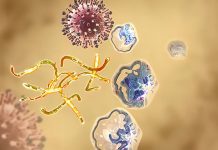
New acne genetics research could influence potential new targets for acne treatment and help with the identification of a high risk of severe disease.
Acne is a common skin condition. Estimates indicate it affects 80% of teenagers and common features include spots and cysts, pigment changes and scarring. Generally, this condition affects the face area, but the chest and back are also common. The type of acne treatment depends on the severity of the condition; however, treatment can include topical retinoids and antibiotics.
The research, published in Nature Communications, is the largest of its kind and involved genetic data from over 20,000 individuals with acne. It was supported by the National Institute for Health Research Guy’s and St Thomas’ BRC. The study was led by investigators at the St John’s Institute of Dermatology at Guy’s and St Thomas’ NHS Foundation Trust and King’s College London and the QIMR Berghofer Medical Research Institute in Brisbane.
Studying over 20,000 people with acne
The researchers analysed nine genome-wide association study datasets from patients around the world. These studies involved scanning the whole genomes of 20,165 people who had acne and 595,232 who did not. The study identified 29 new genetic variants that are more common in people with acne. It also confirmed 14 of the 17 variants already known to be associated with the condition. This brought the total number of known variants to 46.
Professor Catherine Smith is a Professor of Dermatology and Therapeutics at St John’s Institute of Dermatology at Guy’s and St Thomas’. She said: “Despite major treatment advances in other skin conditions, progress in acne treatment has been limited. As well as suffering from the symptoms of acne, individuals describe consequent profound, negative impacts on their psychological and social wellbeing. It’s exciting that this work opens up potential avenues to find acne treatment for them.”
Genetics and acne treatment
A number of genes were identified that are common in people with acne and are also linked to other skin and hair conditions. The team believe this will help to understand the causes of acne, which could be a mix of factors. This further understanding of the causes of this condition could support the improvement of acne treatment by enabling targeted treatment for the acne genes.
Professor Michael Simpson is Head of the Genomic Medicine Group at King’s College London. He said: “We know that the causes of acne are complicated, with a mix of biological factors such as genetics and hormones, and environmental factors. Understanding the genetics of the condition will help us to disentangle some of these causes and find the best way to treat the condition. This is a really promising area for further study and opens up a lot of avenues for research.”
The research also found a link between the genetic risk of acne and disease severity. Individuals who have the highest genetic risk are more likely to have severe disease. Whilst further research is required, this finding raised the potential to identify individuals at risk of severe disease to intervene early with targeted acne treatment.
























